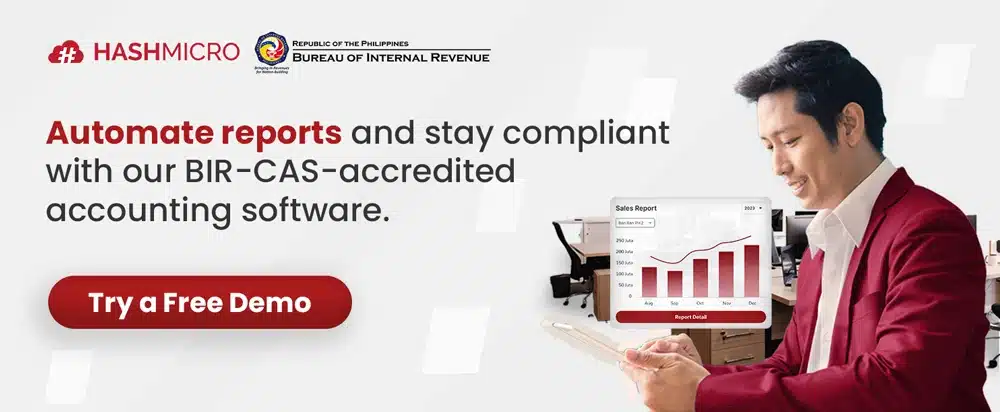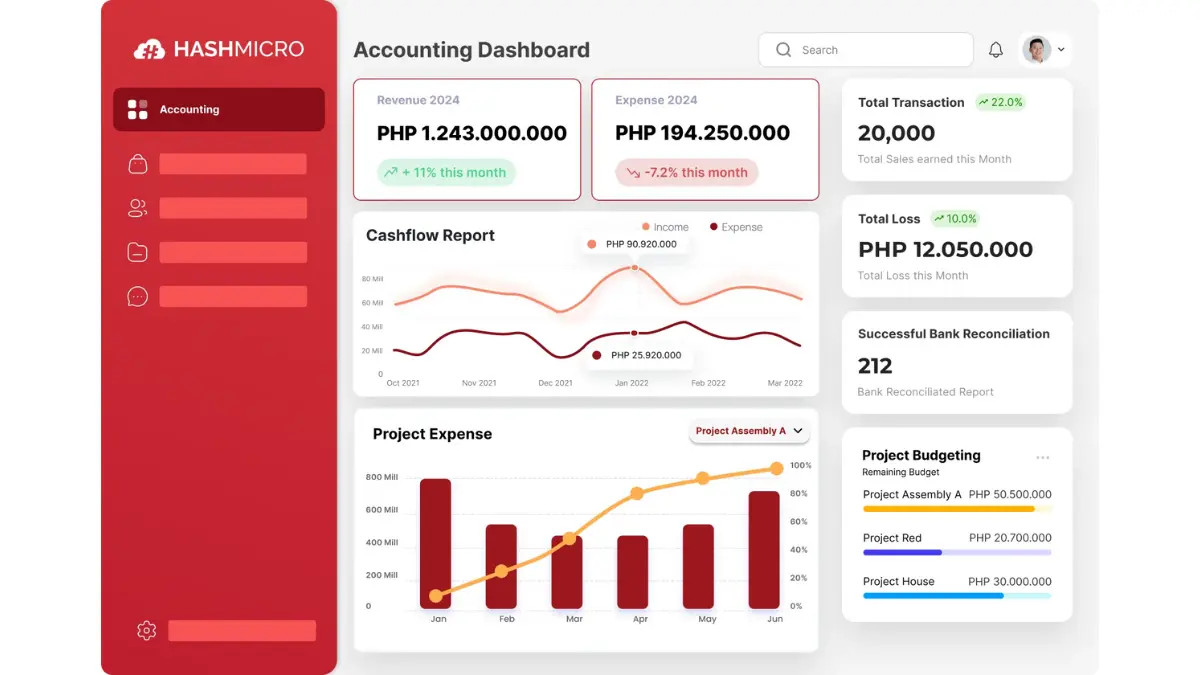Managers are constantly pressured to make swift, informed decisions in today’s fast-paced business environment. An efficient Accounting Information System (AIS) becomes indispensable in navigating this complex landscape.
However, implementing an AIS is not without its challenges. Managers often grapple with issues such as data accuracy, system integration, and user adoption, which can hinder the system’s effectiveness.
A study among SMEs in the Philippines found a strong link between the effectiveness of Accounting Information Systems (AIS) and improved organizational performance. To maximize these benefits, businesses can explore solutions like HashMicro Accounting Software, which is designed to boost efficiency and empower smarter financial decisions.
Continue reading this comprehensive guide to learn more about the intricacies of Accounting Information Systems and explore software solutions that can address these challenges.
Table of Contents

Key Takeaways
|
What is an Accounting Information System (AIS)?
An Accounting Information System (AIS) is a structured framework businesses use to collect, store, process, and report financial data. It plays a crucial role in helping accountants, managers, CFOs, and auditors track financial transactions while ensuring compliance with Generally Accepted Accounting Principles (GAAP) and other regulatory standards.
By integrating traditional accounting as an information system with modern technology, AIS enhances accuracy, efficiency, and decision-making. The system automates complex financial processes, supports real-time reporting, and provides critical insights for internal stakeholders, investors, and tax authorities.
In today’s digital landscape, accounting information systems are predominantly software-based, allowing businesses of all sizes to manage their financials with greater control and transparency. Whether used for tax reporting, auditing, or financial planning, AIS in accounting is a strategic tool that enhances business performance and regulatory compliance.
How Are Accounting Information Systems Useful for an Organization?
An accounting information system (AIS) is an essential tool that helps businesses manage, analyze, and report financial data accurately and efficiently. By integrating accounting as an information system with technology, AIS streamlines financial processes, enhances decision-making, and ensures compliance with industry regulations.
Below are the key ways an accounting information system benefits an organisation, highlighting the core benefits of accounting software in streamlining financial operations and decision-making:
1. Streamlining daily financial operations
An accounting information system automates essential accounting tasks such as recording sales, processing payroll, and managing accounts payable and receivable. By maintaining accurate and up-to-date financial records, businesses can ensure smooth transactions and avoid errors caused by manual data entry.
AIS in accounting also assists in inventory management by tracking stock levels and calculating the cost of goods sold. These capabilities improve efficiency, reduce operational costs, and allow businesses to focus on strategic growth.
2. Enhancing financial reporting and analysis
AIS enables organizations to generate accurate financial statements for both internal and external stakeholders, including balance sheets, income statements, and cash flow reports. With built-in budgeting and forecasting tools, companies can plan expenses, allocate resources efficiently, and predict future financial performance.
Financial ratio analysis, cost accounting, and other analytical tools help assess the company’s financial health and highlight areas for improvement. By centralizing financial data, accounting information systems make it easier for businesses to monitor financial trends and make informed decisions.
3. Supporting data-driven decision-making
With real-time financial data, managers and executives can make better-informed decisions regarding pricing strategies, investments, and resource allocation. AIS in accounting helps identify spending patterns and inefficiencies, allowing businesses to optimize costs and improve profitability.
The system’s analytical capabilities also provide insights into sales performance, helping businesses adjust strategies to meet customer demands. This data-driven approach fosters a competitive advantage and enhances long-term business sustainability.
4. Ensuring compliance and risk management
An accounting information system helps businesses comply with financial regulations by maintaining accurate records and ensuring proper documentation for audits and tax filings. AIS also strengthens data security by implementing encryption, access controls, and cybersecurity measures to protect sensitive financial information from fraud and cyber threats.
Businesses can minimize risks associated with regulatory penalties and financial mismanagement by automating compliance reporting and internal audits. These security measures are essential as organizations increasingly transition to digital financial management.
5. Facilitating tax preparation and auditing
AIS simplifies tax calculations by automatically tracking income, expenses, and deductions, ensuring accurate and timely tax filings. The system generates reports that help businesses prepare for internal and external audits, providing transparency in financial transactions.
With an organized database, auditors can efficiently access financial records and verify compliance with tax regulations. Accounting information systems reduce the risk of errors and penalties by streamlining these processes, making tax preparation and auditing more efficient.
An accounting information system is more than just a financial management tool—it is a critical asset that enhances efficiency, accuracy, and decision-making in organizations of all sizes. By leveraging AIS in accounting, businesses can improve financial control, mitigate risks, and drive long-term success in an increasingly data-driven world.
What Are The Components Of Accounting Information?
An accounting information system (AIS) is a critical framework that monitors a company’s financial and business activities. It comprises six essential components that ensure accurate data collection, processing, and reporting.
Below is a detailed breakdown of the fundamental components of an accounting information system:
1. People: The users of AIS
People are the backbone of an accounting information system as they interact with and manage financial data. This includes accountants, managers, business analysts, CFOs, and auditors who rely on AIS to record transactions, generate reports, and assess financial health.
IT professionals ensure the security and functionality of AIS while compliance officers oversee adherence to regulations and financial standards. A well-implemented AIS provides universal access to relevant financial data, ensuring informed decision-making across all levels of an organization.
2. Procedures and Instructions: The operational framework
Procedures and instructions define how financial data is collected, processed, stored, and reported within an accounting information system. These guidelines include manual and automated processes, ensuring consistency and accuracy in financial reporting.
While AIS software integrates these procedures, employees must also be well-trained to follow established protocols. By maintaining structured and standardized processes, businesses can improve financial efficiency and minimize errors in data management.
3. Data: The core of AIS
Data is the foundation of accounting as an information system, encompassing financial transactions, customer records, payroll, inventory levels, and tax details. This information is stored in structured databases, often managed using SQL for easy retrieval and reporting.
The AIS must provide customizable input screens and output formats to cater to various users and business needs. Accurate and well-organized data is essential for generating financial reports, conducting audits, and ensuring regulatory compliance.
4. Software: The digital infrastructure
AIS software facilitates the automation of accounting functions, reducing manual workload and enhancing accuracy. These systems range from essential accounting software for small businesses to advanced ERP solutions for large enterprises—including some of the best accounting software in the Philippines tailored to local business needs.
The software must be user-friendly, scalable, and compliant with financial regulations to support seamless financial operations. Integrating AIS in accounting ensures real-time access to financial insights, improving decision-making and operational efficiency.
5. IT infrastructure: The technological backbone
An accounting information system relies on a robust IT infrastructure, including hardware, networks, and cloud-based platforms. This infrastructure enables secure data storage, real-time financial tracking, and seamless integration with other business systems.
Cloud-based AIS solutions offer scalability and remote access, ensuring financial data is available anytime and anywhere. A reliable IT framework strengthens financial data security, preventing unauthorized access and cyber threats.
6. Internal controls: Safeguarding financial integrity
Internal controls are essential for ensuring accuracy, security, and compliance within an accounting information system. These measures include authentication protocols, access restrictions, audit trails, and data encryption to prevent fraud and financial mismanagement.
Strong internal controls help businesses maintain financial transparency and adhere to regulatory requirements such as the Sarbanes-Oxley Act (SOX). Implementing effective security measures protects an organization’s financial assets and builds stakeholder trust.
A well-structured accounting information system enhances financial management by integrating these six components into a cohesive and efficient framework. By leveraging AIS in accounting, businesses can streamline financial operations, ensure compliance, and make data-driven decisions for long-term success.
Advantages of Accounting Information Systems
An accounting information system (AIS) enhances financial management by improving efficiency, accuracy, and decision-making. It streamlines processes, ensures compliance, and strengthens security, making it essential for businesses of all sizes.
Below are the key advantages of implementing an accounting information system:
- Efficiency and automation: AIS automates financial processes like data entry, invoicing, and reporting, reducing manual workload. This boosts productivity and allows employees to focus on strategic financial planning. Automation also minimizes delays, ensuring smooth financial operations.
- Accuracy and data integrity: By reducing human errors, AIS in accounting ensures precise financial calculations and reliable data. Automated validation checks prevent inconsistencies, supporting better financial management. Accurate records help businesses make informed decisions and meet compliance requirements.
- Real-time financial reporting: AIS provides instant access to financial data, enabling timely decision-making. For better financial planning, managers can monitor cash flow, expenses, and revenue in real time. This improves business agility and helps organizations respond quickly to market changes.
- Interdepartmental integration: AIS connects financial data across departments, ensuring seamless coordination. Sales, inventory, and accounts payable updates are automatically synchronized to avoid discrepancies. This integration improves workflow efficiency and enhances overall business operations.
- Cost reduction: Automating accounting tasks reduces labor costs and minimizes financial errors that could lead to losses. AIS optimizes resource allocation, cutting unnecessary expenses. By improving efficiency, businesses can operate more profitably with fewer administrative burdens.
- Compliance and regulatory reporting: AIS simplifies financial reporting by automating tax filings, financial statements, and compliance documentation. It ensures that businesses meet regulatory requirements with accurate and timely reports, reducing the risk of penalties and enhancing transparency.
- Enhanced security and internal controls: Accounting information systems protect financial data from unauthorized access with access restrictions, encryption, and audit trails. Internal controls ensure only authorized personnel can modify sensitive information, safeguarding businesses against fraud and data breaches.
- Scalability for business growth: AIS adapts to growing business needs, effortlessly handling increasing transactions and data volumes. As companies expand, AIS supports new functionalities without compromising performance, making it a long-term financial management solution.
- Audit trail and accountability: AIS maintains a chronological record of transactions, ensuring transparency and easy auditing. This helps businesses track financial activities, detect fraud, and meet compliance standards. A clear audit trail strengthens accountability and financial governance.
- Strategic financial planning: AIS provides data-driven insights that support budgeting, forecasting, and investment decisions. It helps businesses analyze trends, optimize cash flow, and plan for future growth, contributing to long-term financial stability and success.
By implementing an accounting information system, businesses improve efficiency, reduce costs, and gain real-time financial insights. AIS ensures compliance, enhances security, and supports strategic growth, making it an essential tool for financial management.
Why do Businesses Use AIS?
Businesses rely on an accounting information system (AIS) to ensure the highest level of accuracy in financial transactions and record-keeping. By automating processes and reducing human errors, AIS in accounting helps maintain reliable financial data, which is crucial for decision-making and regulatory compliance.
Beyond accuracy, an accounting information system enhances security by controlling access to sensitive financial data. It ensures that only authorized personnel can retrieve or modify specific information, reducing the risk of data breaches and unauthorized access.
Additionally, accounting information systems improve fraud detection and financial oversight by tracking transactions and maintaining transparency. With a well-structured AIS, businesses can streamline financial management, ensuring employees can access consistent and up-to-date economic data.
Unlock the Power of a Modern Accounting Information System with HashMicro
HashMicro’s Accounting Software provides a powerful, integrated solution to streamline financial management processes accurately and quickly. Designed to support informed decision-making, this intelligent system ensures that every financial transaction, report, and audit trail is managed efficiently and transparently.
With advanced features like automated journal entries, real-time reporting, and financial forecasting, businesses can eliminate manual errors, reduce operational bottlenecks, and gain complete control over their accounting data. A free and personalised demo will help you discover how a modern accounting system can simplify complex processes.
Why choose HashMicro? Unlike traditional accounting tools, HashMicro’s Accounting Information System offers full cross-module integration, customizable reporting, and intelligent financial automation—all tailored to meet the needs of various industries and business sizes.
Key features of HashMicro Accounting Software:
- Bank Integrations – Auto Reconciliation & Auto Payment: The system connects directly with your bank accounts to automate reconciliations and payments. This minimises manual input, reduces errors, and accelerates cash-handling processes.
- Profit & Loss vs Budget & Forecast: Managers can quickly identify gaps or overspending by comparing actual financial performance against planned budgets and forecasts. This supports timely adjustments to maintain financial health and control.
- Multi-Level Financial Analysis (Per Branch, Project, etc.): The software enables segmented financial analysis by department, branch, or project. This granular insight helps decision-makers allocate resources more strategically and evaluate performance accurately.
- Cashflow & Treasury Forecast Reports: Automated cashflow tracking and treasury forecasting allow businesses to anticipate financial needs and plan ahead, reducing liquidity risks and ensuring operational continuity.
- Multi-Company with Intercompany Consolidation: The system handles multiple entities and seamlessly consolidates financials across companies. It simplifies complex group reporting and ensures compliance in multi-entity environments.
- Chart of Accounts Hierarchy & 3-Way Matching: A structured Chart of Accounts and built-in 3-way matching between invoices, delivery orders, and sales orders strengthen internal controls. This prevents fraud and supports audit readiness.
HashMicro’s Accounting System is built to adapt and scale with your business—giving you the clarity and confidence to manage finances strategically. Ready to transform your accounting processes? Schedule your free demo today and experience more intelligent financial management with HashMicro.
Conclusion
An Accounting Information System is vital in organizing, managing, and analyzing a company’s financial data accurately and quickly. By adopting the right software solution, businesses can automate manual tasks, reduce errors, and make well-informed financial decisions.
HashMicro Accounting Software stands out as a reliable solution for businesses in the Philippines. It offers features tailored to local compliance and multi-company management needs. With its user-friendly interface, built-in automation, and powerful financial analysis tools, HashMicro helps companies streamline accounting processes while staying adaptable to growth.
Ready to experience the benefits of a modern Accounting Information System? Schedule your free demo with HashMicro today and discover how it can transform how you manage your finances.










































